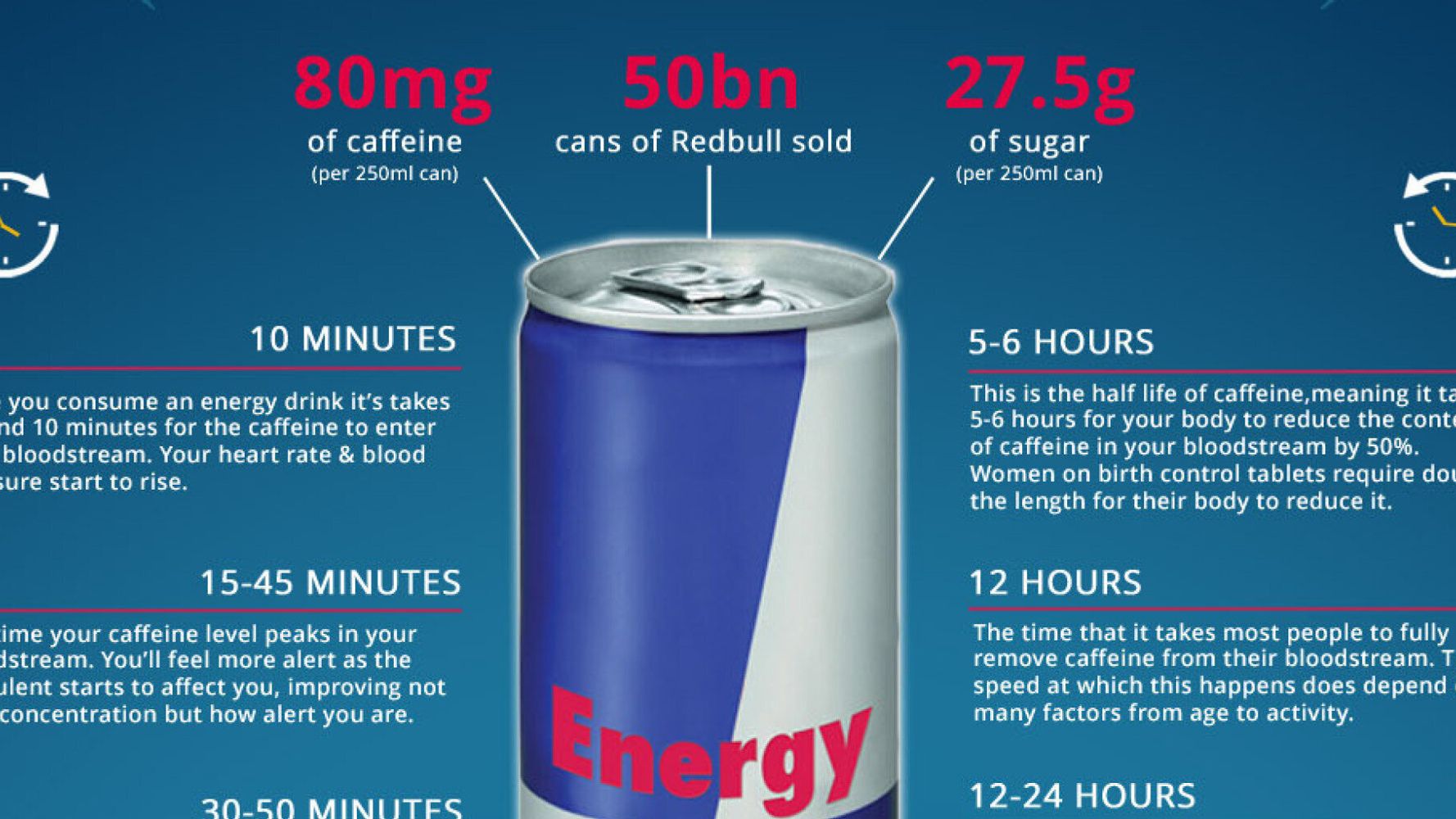
Energy drinks have become increasingly popular due to their advertised ability to boost energy levels and improve performance. One of the primary constituents found in most of these beverages is caffeine.
Caffeine is a naturally occurring stimulant that temporarily relieves the user from fatigue and drowsiness.
Explanation of caffeine and its effects on the body
Caffeine works by stimulating the central nervous system. It blocks the brain’s adenosine receptors, which promote sleep and suppress arousal. By doing this, caffeine temporarily increases energy levels and makes the person feel less tired.
Caffeine also stimulates the production of neurotransmitters such as dopamine and norepinephrine, which are involved in regulating mood, attention, and cognitive function. As a result, caffeine has been shown to improve mental performance, reaction time, and decision-making skills.
However, caffeine consumption can have adverse effects on certain individuals. It can lead to insomnia, anxiety, jitteriness, and an increased heart rate. Also, people who consume large amounts of caffeine regularly can develop a tolerance, which may lead to them needing more caffeine to achieve the same effect.
Brief overview of Red Bull energy drink
Red Bull is one of the most popular energy drinks worldwide. It contains 80 mg of caffeine per 8.4 fl. oz. can, which is about the same amount as in a cup of home-brewed coffee. Red Bull also contains other ingredients such as taurine, glucose, and B-vitamins, which are supposed to enhance energy levels and improve focus.
Numerous studies have examined the effects of Red Bull consumption on athletic performance, cognitive function, and overall health. Some studies have shown that it can improve endurance, alertness, and reaction time. However, other studies have highlighted potential adverse effects such as heart palpitations, headaches, and insomnia.
In conclusion, caffeine is the primary constituent in most energy drinks, including Red Bull. While it can provide short-term benefits such as improved energy levels and cognitive function, it can also have adverse effects on some individuals. Therefore, it is important to consume caffeine in moderation and be aware of its potential side effects.
How Much Caffeine is in Red Bull?
Amount of caffeine in each 8.4 fl. oz. can of Red Bull
According to product information, one 8.4 fl. oz. can of Red Bull contains 80 mg of caffeine. This amount is approximately the same as a cup of home-brewed coffee.
Comparison of caffeine content to other drinks
In terms of caffeine content, regular and sugar-free Red Bull contain 75-80 mg per 8.4-ounce can, which is comparable to most coffee drinks. A cup of coffee typically contains around 96 mg of caffeine per serving.
In terms of serving size, one can of Red Bull is equivalent to two to three cups of coffee or two to three and a half cans of Red Bull. This means that the caffeine content in Red Bull and coffee are comparable per serving.
It is important to note that excessive consumption of caffeine can lead to different health conditions, including anxiety, heart palpitations, and disrupted sleep. It is recommended to consume caffeine in moderation and to consult a healthcare provider if experiencing any negative side effects.
In conclusion, Red Bull contains 80 mg of caffeine per 8.4 fl. oz. can, which is comparable to a cup of coffee. However, it is essential to be mindful of caffeine intake and to consume it in moderation to maintain good health.
Caffeine Informer’s Report on Red Bull
What Caffeine Informer says about Red Bull’s caffeine
Red Bull is a popular energy drink that contains 80 mg of caffeine per 8.4 fl oz can, giving an average of 9.46 mg of caffeine per fl oz. This amount of caffeine is relatively moderate compared to other energy drinks on the market, such as Monster, which contains 160 mg per 16 fl oz can. Caffeine Informer classifies Red Bull as a moderate caffeine drink.
Red Bull’s caffeine content is comparable to that of a cup of home-brewed coffee, which contains around 95 mg per 8 oz serving. It is important to note that excessive intake of caffeine can lead to negative side effects such as anxiety, palpitations, and sleep disruptions. It is essential for individuals to consume caffeine in moderation and to seek medical advice if experiencing negative side effects.
Other key ingredients in Red Bull
In addition to caffeine, Red Bull contains several other ingredients that contribute to its energy-boosting effects. These ingredients include taurine, B-vitamins, and sugar (or artificial sweeteners in the sugar-free version).
Taurine is an essential amino acid that has been shown to improve heart and muscle function, although its exact role in energy drinks is not yet clear. B-vitamins, including niacin, panthenol, B6, and B12, are essential for maintaining energy levels and supporting brain function.
Lastly, Red Bull contains sugar or artificial sweeteners, depending on the variant. The sugar content in one 8.4 fl oz can of regular Red Bull is 27 g, which is equivalent to around 6.5 teaspoons of sugar. Meanwhile, sugar-free Red Bull contains artificial sweeteners such as aspartame and acesulfame K, which have been approved by the FDA as safe for consumption in moderate amounts.
In conclusion, Red Bull contains a moderate amount of caffeine per serving, which is comparable to a cup of coffee. It also contains other ingredients such as taurine and B-vitamins that contribute to its energy-boosting effects. However, it is important to consume caffeine and sugar in moderation to prevent negative side effects and maintain good health.
Starbucks Coffee vs. Red Bull Caffeine Content
Amount of caffeine in a small cup of Starbucks drip coffee compared to Red Bull
Starbucks offers a variety of coffee drinks, ranging in caffeine content from low to high. A small cup (12 fl. oz.) of drip coffee from Starbucks contains around 109 mg of caffeine, which is more than the 80 mg found in one 8.4 fl. oz. can of Red Bull.
It is worth noting that the amount of caffeine in coffee can vary depending on the brewing method and the type of coffee bean used. The caffeine content in Starbucks drip coffee can range between 75 mg to 165 mg per 12 fl. oz. cup.
In comparison, 16 fl. oz. of the popular Starbucks Pike Place Roast contains 310 mg of caffeine, while a grande (16 fl. oz.) brewed coffee from Starbucks contains around 330 mg of caffeine.
Comparison of caffeine content in other Starbucks drinks
Starbucks offers a variety of drinks, including tea, frappuccinos, and energy drinks. In terms of caffeine content, a tall (12 fl. oz.) Starbucks Caffe Latte contains 75 mg of caffeine, while a tall Starbucks Americano contains 150 mg of caffeine.
A grande Starbucks Caffe Mocha contains 175 mg of caffeine, while a grande Starbucks White Chocolate Mocha contains 150 mg of caffeine. In comparison, an 8.4 fl. oz. can of Red Bull contains 80 mg of caffeine, which is less than any of these drinks.
It is essential to consider the added ingredients and calories in these drinks as well as their caffeine content. Energy drinks like Red Bull contain ingredients besides caffeine, such as taurine and B vitamins, which may have an impact on how your body responds. Additionally, some Starbucks drinks may contain added sugar and syrups, which can add extra calories to your diet.
In conclusion, the caffeine content in a small cup of Starbucks drip coffee is higher than that in one can of Red Bull. However, Starbucks offers a range of drinks with varying caffeine content, and it is essential to consider the other ingredients, calories, and serving size when determining your caffeine intake.
Tea and Soda Caffeine Content
Amount of caffeine in black tea and other popular sodas
Black tea is a popular beverage known for its potential health benefits, such as reducing the risk of heart disease and stroke. A brewed 8 oz. cup of black tea contains an average of 47 mg of caffeine. However, certain types of black tea and brewing methods may result in a higher caffeine content.
In comparison, the caffeine content in popular sodas varies. A 12 oz. can of Coca-Cola contains around 34 mg of caffeine, while a 12 oz. can of Mountain Dew contains around 54 mg of caffeine. Similarly, a 12 oz. can of Dr. Pepper contains around 41 mg of caffeine, while a 12 oz. can of Pepsi contains around 38 mg of caffeine.
Comparison of caffeine content to Red Bull
When comparing the caffeine content in black tea and popular sodas to Red Bull, a small 8.4 fl. oz. can of Red Bull contains 80 mg of caffeine. This is significantly higher than the caffeine content in most sodas but less than the caffeine content in a small cup of Starbucks drip coffee.
It is worth noting that caffeine intake should be monitored and limited to avoid potential negative side effects, such as insomnia, restlessness, and headaches. It is also important to consider the overall nutritional value of the beverages you consume, as some sodas can contain high levels of sugar and artificial ingredients.
In conclusion, while black tea and certain sodas may contain caffeine, the amount is generally less than the caffeine content in Red Bull and Starbucks drip coffee. However, as with all beverages, it is essential to consume them in moderation and to consider their overall nutritional value.
The Effects of Caffeine on the Body
Short-term and long-term effects of caffeine consumption
Caffeine consumption can have both short-term and long-term effects on the body. In the short term, caffeine can increase alertness, decrease fatigue, improve mood, and enhance athletic performance. These effects are due to caffeine’s ability to stimulate the central nervous system and increase the release of adrenaline and dopamine.
However, excessive caffeine consumption can lead to unwanted side effects, such as anxiety, jitteriness, headaches, and insomnia. In some cases, it can also cause nausea, vomiting, and an increase in heart rate and blood pressure.
In the longer term, regular caffeine consumption can lead to changes in brain chemistry, tolerance, and addiction. People who consume caffeine daily may develop a tolerance to its effects over time, which means they need to consume more caffeine to achieve the same level of stimulation. This can lead to dependence and addiction, which can cause withdrawal symptoms such as headaches, fatigue, and irritability when attempting to cut back or quit.
Caffeine tolerance and addiction
Caffeine tolerance and addiction can have significant impacts on daily life. People who consume caffeine regularly may find it challenging to function without it, experiencing symptoms of withdrawal when attempting to cut back or quit. Dependence on caffeine can also interfere with sleep patterns and lead to disruptions in daily activities, such as work, school, or social events.
It is essential to be mindful of caffeine consumption and to monitor its effects on the body. Ingesting moderate amounts of caffeine (less than 400 mg per day) is generally considered safe for most adults. However, consuming higher amounts can lead to unwanted side effects and potential health risks, particularly for those with underlying health conditions.
In conclusion, while caffeine can have short-term benefits, it is vital to be aware of the potential risks associated with excessive consumption. Regular caffeine consumption can lead to tolerance, dependence, and addiction, which can have significant impacts on daily life. It is best to consume caffeine in moderation and be mindful of its effects on the body.
Caffeine Intake Limits and Recommendations
Recommended daily caffeine intake limit
Studies indicate that healthy adults can safely consume up to 400 mg of caffeine per day, equivalent to approximately 4 cups (945 mL) of coffee or 5 regular cans (42 ounces or 1.2 liters) of Red Bull. However, pregnant women are advised to consume no more than 200–300 mg of caffeine per day, depending on the health agency. This amount is equal to 2–3 cups (475–710 mL) of coffee or 2–3.5 cans (16.8–29.4 ounces or 496–868 mL) of Red Bull.
It is essential to be mindful of caffeine consumption and to monitor its effects on the body. Ingesting moderate amounts of caffeine is generally considered safe for most adults. However, consuming higher amounts can lead to unwanted side effects and potential health risks, particularly for those with underlying health conditions.
Other factors to consider when consuming caffeine
In addition to the amount of caffeine consumed, other factors can influence its effects on the body. The type of product ingested, serving size, individual tolerance, and timing of consumption all play a role in how caffeine affects individuals.
For example, coffee and Red Bull contain comparable amounts of caffeine per serving, although coffee generally contains slightly more. However, coffee also contains additional nutrients and antioxidants and has been linked to various health benefits, such as reduced risk of heart disease and diabetes.
Individual tolerance to caffeine can also vary greatly, with some people experiencing pronounced effects after just one cup of coffee, while others may need several cups before feeling any effects. Additionally, consuming caffeine later in the day can interfere with sleep patterns and lead to disruptions in daily activities.
In conclusion, while moderate caffeine consumption can have some short-term benefits, it is crucial to be aware of the potential risks associated with excessive consumption. Recommended daily caffeine intake limits exist for different groups, and other factors, such as product type, serving size, individual tolerance, and timing of consumption, can all influence caffeine’s effects on the body.
Red Bull Consumption and Safety Concerns
Red Bull is a popular energy drink that contains caffeine, sugar, B vitamins, and other energy-boosting compounds. While moderate intake of Red Bull is unlikely to have any serious side effects, excessive consumption can lead to negative effects and potentially life-threatening consequences.
Research recommends limiting caffeine intake to 400mg per day or less in healthy adults. A single can of Red Bull, containing 80mg of caffeine in a 250-ml can, is within the recommended daily limit. However, drinking more than 5 cans per day could increase the risk of caffeine overdose, especially in young adults. Symptoms of caffeine overdose and toxicity can include nausea, vomiting, hallucinations, rapid heart rate, dizziness, trouble sleeping, and seizures.
Furthermore, excessive sugar intake is linked to various health risks, such as obesity, type 2 diabetes, and heart disease. Red Bull contains sugar and artificial colors, which can contribute to weight gain and tooth decay.
Red Bull’s manufacturer recommends drinking no more than two cans per day, with each can separated by at least 3-4 hours. Pregnant women, nursing mothers, and minors are advised to avoid the drink due to its caffeine and sugar content. Red Bull is not intended to treat, cure, or prevent any disease or condition. It is a beverage designed to provide a temporary boost of energy and should not be used as a substitute for sleep or rest.
Summary of key points on Red Bull caffeine content and effects
– Red Bull contains 80mg of caffeine per 250-ml can, which is about the same amount found in a cup of coffee
– Moderate Red Bull consumption is unlikely to have any serious side effects, but excessive consumption can lead to caffeine overdose and negative health effects
– Research recommends limiting caffeine intake to 400mg per day or less in healthy adults
– Red Bull’s warning statement advises consuming no more than two cans per day and avoiding the drink during pregnancy, nursing, and childhood.
Final thoughts and recommendations for safe caffeine consumption
While moderate intake of Red Bull is generally safe, it is essential to monitor caffeine intake and its effects on the body. Those with underlying health conditions or who are sensitive to caffeine should consult with their healthcare provider before consuming energy drinks like Red Bull.
To reduce the risk of negative health effects, it is recommended to limit caffeine intake, avoid consuming caffeine later in the day, and use caution when mixing caffeine with other substances such as alcohol.



